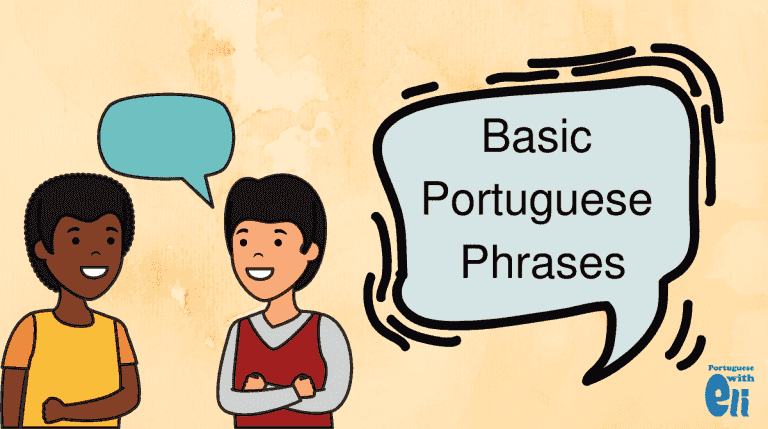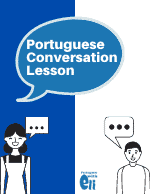48 Basic Portuguese Phrases that Will Help You Survive in Brazil

Casey has scheduled a quick trip to Brazil. She wants to meet her friends — who speak English — and get to know some tourist spots in Rio de Janeiro.
She isn’t likely to use Portuguese after her trip, but she wants to make sure she connects with locals when in Brazil.
Casey may not have the time to invest in learning Portuguese, but getting some basic Portuguese phrases isn’t hard. And that’s what she — and hopefully, you — will learn in this article.
Before We Get Started with the Basic Portuguese Phrases…
If you’re a bit more advanced—perhaps you can speak and understand things already—I suggest you listen to our podcast, Intermediate Portuguese.
Thanking People
The important thing to note when you want to thank people in Portuguese is that the word for “thanks” changes according to who speaks.
As a woman, you would say “Obrigada”. And as a man, you would use the masculine version, the one that ends with an O.
The full words that you see between parentheses are things you can add. They usually intensify whatever you’re saying.
- Obrigado / obrigada. Thank you.
- Muito obrigado (a). Thank you very much.
- Muitíssimo obrigado (a). Thanks a million.
- Valeu (mesmo). Thank you (really).
- Agradeço (muito, muitíssimo). I thank you.
Saying You’re Welcome
- Que é isso. Don’t mention it.
- Não foi nada. That was nothing.
- De nada. You’re welcome.
- Não há de quê. There is nothing to thank me for.
- Nnnada. No problem.
If you use #10, you have to stretch the N letter. It’s as if you said “de nada” but just gobbled up the first word. The stretching here means that you’re linking words.
Asking for Something
In colloquial speech, Brazilians tend to say “faz favor” for “please”. This has a very familiar touch to it. If you want instant connection, use it — but remember: it’s colloquial.
- Por favor. Please.
- Este aqui, por favor. This one, please.
- Aquele ali, por favor. That one, please.
- Você pode me ajudar? Can you help me?
Basic Portuguese Greetings
Brazilians tend to stick to the clock when greeting people. I have Russian friends who say good afternoon at 9 PM — after all, in St. Petersburg they have the white nights. Both phenomena — saying good afternoon that late in the evening and having sun during the night are strange things to us in Brazil.
So, from…
- 5 AM to 12 PM, say bom dia.
- From 12 PM to 6 PM, say boa tarde.
- From 6 PM to midnight, say boa noite.
The problem comes when you want to say good “something” in the small hours of the morning. Personally, I prefer “bom dia” but there’s a more specific word for that. Madrugada (as in “boa madruaga”).
Anyway, you won’t probably meet people at that time. And if you do, I hope it’s safe.
- Bom dia. Good morning.
- Boa tarde. Good afternoon.
- Boa noite. Good evening.
- Oi, tudo bem com você? Hi, how are you?
- E aí? Beleza? What’s up?
Saying Goodbye
Most Brazilians will stick to “tchau”. It’s the most common, it sounds nice, and it’s easy to pronounce. You can use any option below.
But some textbooks also teach you the word “Adeus”. You only say this to people will never see anymore.
- Tchau. Bye.
- Tchau-tchau. Bye bye.
- Tchauzinho. Byee.
- Até logo / a próxima. See you soon.
- Até! See ya.
Asking Where Something Is
Attention to the verb “ficar”. It’s widely used in Portuguese.
Here, it means “to be located”. And, you can use it when you ask about the location where you find institutions, buildings, and things that don’t move — in general.
You would draw funny looks if he used this verb to ask where someone is.
- Onde (é que) fica X? Where is X (located)?
- Você pode me dizer onde fica X? Can you tell me where X is?
- Como chego em X? How do I get to X?
- Como faço para chegar em X? How can I get to X?
- Onde é (o, a) X? Where is X?
Asking If Someone Speaks A Language and Answering That Question
- Você sabe falar inglês? Can you speak English?
- Você pode falar inglês? Are you able to speak English?
- Você fala inglês? Do you speak English?
- Não falo… não sei falar… não posso falar… I don’t speak … I can’t speak… I’m not able to speak…
You see, #30 uses the verb “saber” (to know) but it means “can” in the sense of “to have the ability to do something because you learned it”.
It’s a pretty common use. Most Brazilians prefer it to “pode” because the latter is ambiguous. You can take a look at this article where explain how you can use the verb “poder” and its difference from a similar verb, “conseguir“.
Saying You Didn’t Understand and Asking to Repeat
- Como? Pode repetir, por favor? What? Can you repeat, please?
- Repita, por favor. Repeat, please.
- Como é? Eu não entendi muito bem. Come again? I didn’t get it very well.
- Desculpe, não entendi. Pode repetir, por favor? Sorry, I didn’t understand it. can you repeat, please?
Using any of these without including “por favor” may come off as rude or angry.
Counting Money
(this audio is for this and the next section)
- Preciso de dois e cinquenta. I need two-fifty.
- Preciso de dois reais e cinquenta centavos. I need R$ 2,50.
Attention to the plural for the currency in Portuguese: o real, os reais.
And for a more in-depth guide on numbers, you can go here.
Buying Stuff in Portuguese
- Quero comprar um X. Vocês têm aqui? I want to buy X. Do you have it here?
- Queria comprar um… I’d like to buy…
- Estou procurando um X, vocês têm? I’m looking for X, do you have [it available]?
- Estou querendo um X. Você tem? I want X. Do you have it?
- Quero um assim. I want one like that.
Asking for Help in Portuguese
- Pode me ajudar? Can you help me?
- Pode me dar uma ajudinha? Can you give me a little help?
- Preciso de uma ajuda (sua). I need your help. [I could use some help of yours].
- Me dá uma mão aqui, por favor. Give me a hand here, please.
And that’s it. With these basic Portuguese phrases— highly frequently used and very easy to commit to memory — you can get started in learning Portuguese.
And our hypothetical student — Casey — can rest assured that she’s going to have a great time in Brazil.
And since you’re here, how about deepening your knowledge and becoming a savvy learner with the following articles?
- How to Greet Like a Brazilian
- Ways to Say Thank You
- Ways to Congratulate
- How to Use the Plural in Portuguese
Learn More in One Hour — Guaranteed
Speak from the very first moment, with careful help that allows you to speak Portuguese instead of being lectured in it. With our lessons, you’ll discuss everyday subjects that are interesting and immediately useful. And we guarantee each one of our lessons. Learn more.





Eli, thank you for providing these helpful phrases. I have been studying for quite awhile, and yet don’t have such a useful list as this!
Thanks, Susan! I’m glad it helps 🙂
Valeu mesmo!
De nada!